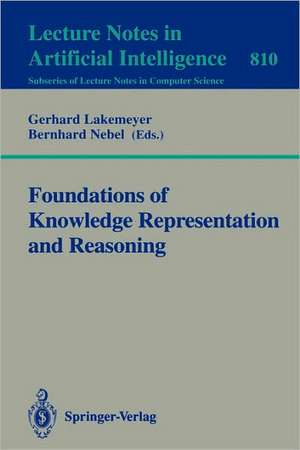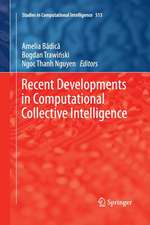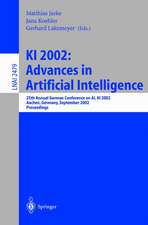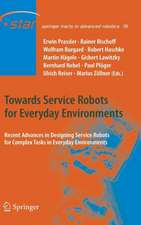Foundations of Knowledge Representation and Reasoning: Lecture Notes in Computer Science, cartea 810
Editat de Gerhard Lakemeyer, Bernhard Nebelen Limba Engleză Paperback – 28 iun 1994
In total, the volume provides a well-organized report on current research in knowledge representation, which is one of the central subfields of AI. Except the surveys, the papers grew out of a workshop on Theoretical Foundations of Knowledge Representation and Reasoning, held in conjunction with the 10th European Conference on Artificial Intelligence (ECAI-92) in Vienna in August 1992.
Din seria Lecture Notes in Computer Science
- 20%
 Preț: 1061.55 lei
Preț: 1061.55 lei - 20%
 Preț: 341.95 lei
Preț: 341.95 lei - 20%
 Preț: 369.12 lei
Preț: 369.12 lei - 20%
 Preț: 645.28 lei
Preț: 645.28 lei - 20%
 Preț: 591.51 lei
Preț: 591.51 lei - 15%
 Preț: 580.46 lei
Preț: 580.46 lei -
 Preț: 410.88 lei
Preț: 410.88 lei - 20%
 Preț: 504.57 lei
Preț: 504.57 lei -
 Preț: 381.21 lei
Preț: 381.21 lei - 20%
 Preț: 340.32 lei
Preț: 340.32 lei - 20%
 Preț: 1414.79 lei
Preț: 1414.79 lei - 20%
 Preț: 538.29 lei
Preț: 538.29 lei - 20%
 Preț: 583.40 lei
Preț: 583.40 lei - 20%
 Preț: 1075.26 lei
Preț: 1075.26 lei - 20%
 Preț: 238.01 lei
Preț: 238.01 lei - 17%
 Preț: 360.19 lei
Preț: 360.19 lei - 20%
 Preț: 438.69 lei
Preț: 438.69 lei - 20%
 Preț: 1183.14 lei
Preț: 1183.14 lei - 20%
 Preț: 596.46 lei
Preț: 596.46 lei - 15%
 Preț: 438.59 lei
Preț: 438.59 lei - 20%
 Preț: 655.02 lei
Preț: 655.02 lei - 20%
 Preț: 649.49 lei
Preț: 649.49 lei - 20%
 Preț: 309.90 lei
Preț: 309.90 lei - 20%
 Preț: 337.00 lei
Preț: 337.00 lei -
 Preț: 449.57 lei
Preț: 449.57 lei - 20%
 Preț: 310.26 lei
Preț: 310.26 lei - 20%
 Preț: 1024.44 lei
Preț: 1024.44 lei - 20%
 Preț: 579.30 lei
Preț: 579.30 lei - 20%
 Preț: 763.23 lei
Preț: 763.23 lei - 20%
 Preț: 453.32 lei
Preț: 453.32 lei - 20%
 Preț: 575.48 lei
Preț: 575.48 lei - 20%
 Preț: 585.88 lei
Preț: 585.88 lei - 20%
 Preț: 326.98 lei
Preț: 326.98 lei - 20%
 Preț: 825.93 lei
Preț: 825.93 lei - 17%
 Preț: 427.22 lei
Preț: 427.22 lei - 20%
 Preț: 763.23 lei
Preț: 763.23 lei - 20%
 Preț: 350.21 lei
Preț: 350.21 lei - 20%
 Preț: 307.71 lei
Preț: 307.71 lei - 20%
 Preț: 580.93 lei
Preț: 580.93 lei - 20%
 Preț: 340.32 lei
Preț: 340.32 lei - 20%
 Preț: 343.62 lei
Preț: 343.62 lei - 20%
 Preț: 583.40 lei
Preț: 583.40 lei - 20%
 Preț: 583.40 lei
Preț: 583.40 lei -
 Preț: 389.48 lei
Preț: 389.48 lei - 20%
 Preț: 353.50 lei
Preț: 353.50 lei - 20%
 Preț: 607.39 lei
Preț: 607.39 lei
Preț: 336.35 lei
Preț vechi: 420.43 lei
-20% Nou
Puncte Express: 505
Preț estimativ în valută:
64.38€ • 66.96$ • 53.95£
64.38€ • 66.96$ • 53.95£
Carte tipărită la comandă
Livrare economică 13-27 martie
Preluare comenzi: 021 569.72.76
Specificații
ISBN-13: 9783540581079
ISBN-10: 3540581073
Pagini: 372
Ilustrații: IX, 363 p.
Dimensiuni: 155 x 233 x 20 mm
Greutate: 0.53 kg
Ediția:1994
Editura: Springer Berlin, Heidelberg
Colecția Springer
Seriile Lecture Notes in Computer Science, Lecture Notes in Artificial Intelligence
Locul publicării:Berlin, Heidelberg, Germany
ISBN-10: 3540581073
Pagini: 372
Ilustrații: IX, 363 p.
Dimensiuni: 155 x 233 x 20 mm
Greutate: 0.53 kg
Ediția:1994
Editura: Springer Berlin, Heidelberg
Colecția Springer
Seriile Lecture Notes in Computer Science, Lecture Notes in Artificial Intelligence
Locul publicării:Berlin, Heidelberg, Germany
Public țintă
ResearchCuprins
Foundations of knowledge representation and reasoning.- Collective entities and relations in concept languages.- Computing extensions of terminological default theories.- A formalization of interval-based temporal subsumption in first order logic.- Normative, subjunctive and autoepistemic defaults.- Abductive reasoning with abstraction axioms.- Queries, rules and definitions as epistemic sentences in concept languages.- The power of beliefs or translating default logic into standard autoepistemic logic.- Learning an optimally accurate representation system.- Default reasoning via negation as failure.- Weak autoepistemic reasoning and well-founded semantics.- Forming concepts for fast inference.- A common-sense theory of time.- Reasoning with analogical representations.- Asking about possibilities — Revision and update semantics for subjunctive queries Extended report.- On the impact of stratification on the complexity of nonmonotonic reasoning.- Logics of mental attitudes in AI.- Hyperrational conditionals.- Revision by expansion in logic programs.















